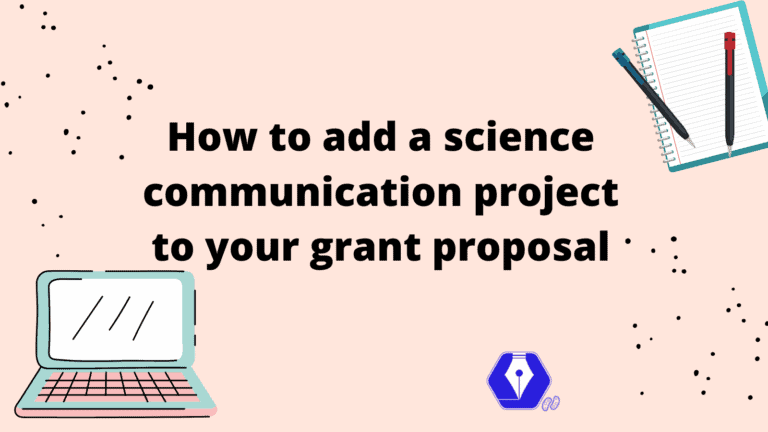You’re sitting on your newest grant proposal. You worked out your research project, explained its scientific background and elaborated on the open questions that you want to address with your experiments.
You’re hitting the section of disseminating your research with outreach activities. Science outreach – sure it seems to be important; everyone talks about it.
But how are you supposed to address science communication with your grant proposal? How do you know which science outreach activity would be suitable for your research project?
Don’t worry, science communicators are here to help you tackle these questions. They are experts when it comes to talking about your research to different audiences and how best to wrap your key message to make it engaging.
Science communicators will also help you budget for science communication projects. And you can add this budget as a science outreach activity to your grant proposal.
But first, let’s look at why science outreach is important and why you should consider it for your next grant proposal.
Why you should add science communication to your grant proposal
Many institutes have internal communication departments set up. These are often responsible for press releases or to communicate with stakeholders. Yet, few non-scientists follow institutional News or Blogs. So, it is a good idea to implement other science communication strategies to target broader audiences and tell them about your amazing research.
By collaborating externally on science outreach projects, you will be able to tell more people about your research. And with these science outreach activities, you can gain lots of benefits.
Give you more time to focus on your research
Great science outreach projects take a lot of time. And yes, time is a valuable good in the life of every researcher. There are so many other things to do: Do and plan experiments, write research papers and grants, supervise students and edit their thesis, be an active faculty member. The list goes on.
Adding science outreach to that list will become overwhelming. So, why not let externals take over these projects? They already have the motivation, the right expertise and tools to work on science outreach projects. This will give you more time to focus on the important aspects of your job and your ongoing research projects.
Increase the visibility of your research
By telling others about your research projects, you not only enhance your own reputation but also help advance science. Other researchers will learn from your findings and use them to tackle their own research questions. Thus, by sharing your research and helping others progress with their research, you will advance human knowledge.
Increasing the visibility of your research might also help you find new collaborators. Someone might stumble upon your science outreach article or video, and they might get interested in your approach or technique. Such coincidence can result in interesting collaborations and fruitful projects.
Highlight the importance of your research
Most of the money that you receive from grants comes from public funding. So, it is only fair to tell the public how their money is used. Tell them what the public gains from spending money on research and how their lives improve with it.
Your research will likely help make our lives healthier, easier, more convenient, cheaper or greener. People want to know how research advances their lives and how your research findings can help them live a more fulfilling life. So, if you contribute to this important task – either directly or indirectly – tell people about it and make it clear why YOUR research is important!
Get future scientists interested in your research
Advancing science also means training the next generation of researchers. By talking about your amazing research, you might trigger interest in future scientists. Or you might find your next PhD student or postdoc.
You could find your next lab member by presenting you and your research in a way that appeals to them. If they don’t know about you and your research, how else will they realise that they want to work on your project?

How to add a science communicator to your grant proposal
You might now agree that starting a science outreach project will put you and your research project in a better position. So, let’s add a science communication project to your next grant proposal.
Science communicators can help you shape your science outreach project and create an activity on a budget. Let’s have a look at the steps to get started on your science communication project.
Know your key message
By addressing your next research question, you are likely already trying to improve people’s lives. With a science outreach project, you now get the chance to tell people outside of your lab why and how you want to do that. So, go and tell them why your research is important!
When thinking of a science outreach project, make sure you are aware of your key message. A science communicator will then help you spread your message by using wordings and tools that are appropriate for your target audience.
Start a collaboration with a science communicator
Finding a science communicator is a bit tricky since the job description only started to emerge recently. But there are platforms, like Lifeology, on which you can find science communicators, or businesses offering science communication services.
Another option is Twitter. You can look for #scicomm or #sciencecommunication and you will find lots of people active in the field. You can even look more specifically for science writers using #sciwri or #sciencewriting, or science artists using #sciart.
From this list, I suggest to get a science communicator who has expertise in your research field. Most people are genuinely interested in collaborating on a project. So, reach out to them and tell them about your work and idea!
Decide on a format to reach your target audience
The format of your science outreach activity depends on your target audience, your research project and your budget.
If you want to reach younger people, social media is a great option.
If you aim to explain the nitty-gritty of your research project, consider writing an article for a science blogging platform or an online magazine. In that case, you might want to contact a science writer with expertise in copywriting.
Do you work on a project that can be visualised? Then creating a comic or infographic would be great and a science illustrator might be your go-to person.
Or you prefer to produce an engaging video and publish it on a platform for STEM videos. Thus, a science communicator specialised in animations could be an option.
The opportunities are endless – and will likely depend on the amount you can ask for in the grant. You can also consider presenting the same content using different formats to reach even more people.
It is definitely good to explore options with your science communicator. You will be surprised at how many different projects science communicators and science writers often work on.
Develop a science communication budget
So, you worked out a science outreach activity that you want to add to your grant application. Now, it is time to discuss the budget with your science communicator. Most freelancers or science communication businesses charge by projects and will be able to give you an estimate of the costs.
You can add this number to your grant application or try to cut some costs. For example, one of your lab members might be a creative wizard and can produce some cool illustrations, videos or GIFs for your project. In that case, you would not need the science communicator to produce such media and you could save money by using internally created visuals.
Here, good advice is to be open with your science communicator and develop a strategy that works for you and them.

Collaborating to get the message clear
Just as collaborations are important to produce amazing research results and high-impact papers, they are essential to disseminate your research to people outside of scientific fields. By working together with a science communicator, you will be able to create some amazing projects to highlight the importance of your research.
Hopefully, this outline helped you shed some light on why science outreach is important for researchers and how to budget science outreach projects in your next grant proposal. If you got any questions about this topic, add a comment below or send us an e-mail!


2 Responses
Hi,
I am a research scientist and interested in seeing how I can develop skills in communicating science for funding purposes and increasing visibility. How can I take some courses on this?
Kind regards,
Victor Ofula